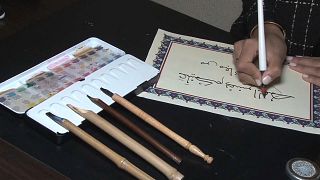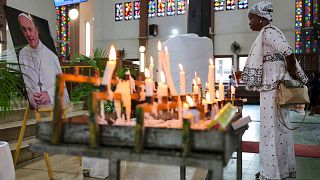Egypt
Amidst a landscape of rice fields in the Nile Delta, the farmers of Al-Qaramous have relied on papyrus for decades. Today, they are struggling to save their livelihood threatened by the scarcity of tourists.
In the 1970s, the farmers of this village, located 80 kilometers northeast of Cairo, reappropriated age-old agricultural and craft techniques that had almost disappeared.
Since then, the majority of Egyptian papyrus production comes from the surrounding area, in the governorate of Charqiya, according to professionals in the sector.
While papyrus was used in ancient Egypt as a medium for writing, paintings on the precious leaf from the plant are now a favorite souvenir for foreign visitors.
The artists, based in Al-Qaramous or Cairo, have a wide range of subjects at their disposal: hieroglyphs, pharaohs, ancient gods and goddesses, Arabic calligraphy or even landscapes.
But after the popular revolt of 2011 and the political instability that followed, tourists deserted the country.
In 2020, tourists were just beginning to return to Egypt when the Covid-19 epidemic struck, once again affecting this crucial sector.
That year, the country earned only four billion dollars in tourism revenue, compared to the expected 16 billion.
Now, in Al-Qaramous, 25 farms are trying to make a living from papyrus, compared to about 500 before 2011, says Saied Tarakhan, 60, a farmer and painter who founded an association of industry professionals in 2014 in the village.
"I have lost about 80 percent of my income, I used to have nearly $1,000 a month and now almost zero," Tarakhan, who owns a 0.2-hectare field, tells AFP.
Thinking outside the box
Abdel Mobdi Moussalam, 48, owns a papyrus leaf processing workshop in the village.
The plant, which can reach four meters in height and grows with its feet in the water, is characterized by its fan-shaped foliage, famous for having inspired the capitals of the columns of many Egyptian temples.
To transform it, the gestures have not changed for thousands of years. The stem, once harvested, is cut into thin strips with a wire. These are immersed in water, then aligned on squares of fabric. The whole is placed under a press and put to dry.
"Papyrus is our only source of income. I don't know anything else. This is my life," says Mr. Moussalam, who also laments losses of about 80%.
Before 2011, he employed eight workers. Today, only two people work for him.
In Giza, not far from the famous pyramids, Ashraf el-Sarawi, 48 years old, owner of a vast store of paintings on papyrus, empty of tourists, confirms the malaise that reigns in the sector, while keeping hope.
"Tourism never dies, it may be sick for a while but it will come back," he says, assuring that his store, which closed for several months because of the epidemic, has lost the vast majority of its income since last year.
To escape the crisis, Saied Tarakhan has diversified his production. He now makes papyrus notebooks, printer-friendly sheets, and sheets made from recycled papyrus.
"We are trying to think outside the box so we can continue," he explains. "I say thank you to Covid-19! It allowed us to develop our work during the lockdown."
For the past few months, his son Mohamed, 30, has launched the family business into online trading.
"At first, we were selling only in the local market, but after Covid, we tried to reach more people (...) so we started selling our products online outside Egypt," says Mohamed Tarakhan.
AFP











01:42
Cairo service honours Pope Francis' legacy
01:02
WHO member countries draft landmark preparedness treaty for next pandemic
Go to video
Mauritius: Ex-finance minister released on bail after corruption charges
Go to video
Letsile Tebogo shines at FNB Golden Prix ahead of 2025 World Championships
01:01
Salah signs new Liverpool deal
Go to video
Gaza: Egypt's foreign minister rejects displacement of Palestinians